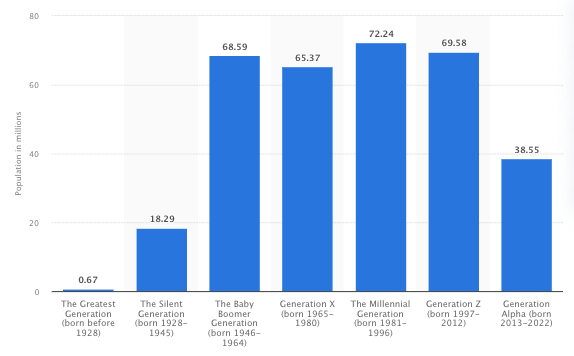
Generation Z, or Zoomers as they are commonly known, wield significant purchasing power but remain skeptical of most brands. As the first generation of true digital natives, this younger cohort values authenticity, inclusivity, and convenience when engaging with companies.
Zoomers, or those born from 1997 to 2012, now have about $360 billion in discretionary income, as reported by the US digital marketing firm Fluent. This number is expected to grow as more young people start working and earning their own money. However, many brands have found it hard to gain their trust and capture their attention as customers.
Zoomers grew up with the internet at their fingertips. They favor mobile-first experiences and are content hoppers, readily moving on if an advertisement, product, or service fails to meet their standards. Their average attention span for ads hovers around just 1.3 seconds, highlighting the challenge brands face in connecting, Fluent’s report emphasizes.
Despite being stereotyped as lazy and entitled, Zoomers actually exhibit a number of positive traits. They are collaborative, tech-savvy, pragmatic, inclusive, and racially diverse. However, these characteristics have also made them more critical of establishments and corporations lacking transparency, diversity, and a meaningful purpose.
Also read: Best LinkedIn Marketing Agencies for 2023
Numerous studies show that over 90% of Zoomers own smartphones and spend roughly five hours a day on their devices. While savvy shoppers focused on value, they are equally invested in online communities and content. Some 89% spend at least an hour daily on social media, where they discover new products and share about brands they enjoy.
Holistic experiences that merge the digital and physical worlds appeal most to Gen Z. They expect hyper-personalization, 24/7 accessibility and a seamless omnichannel experience from the brands they patronize.
Engage in Authentic Conversations and Loyalty Campaigns Are Enticing to Them
To win over Zoomers, companies should think beyond traditional ads and promotions. Focusing on building an authentic dialogue, sharing value-driven content, and empowering Gen Z creators and influencers within niche communities can help forge long-term connections based on shared interests and passions.
Subscription services, fast-casual dining, and social commerce also represent opportunities to capture this lucrative demographic. Around 40% of Zoomers currently subscribe to at least one online service for convenience and added value. Meanwhile, over half have loyalty apps from quick service restaurants and nearly half have made purchases directly from a social media platform.

As Zoomers continue to assert their spending power, brands able to navigate this generation’s unique set of expectations stand to reap significant rewards. Getting there will require avoiding one-size-fits-all solutions and prioritizing shared values, inclusivity, and transparency in all marketing efforts.
Also read: Top Programmatic Ads Agencies for 2023
By putting people before profits and focusing on creating meaningful change, businesses may yet earn a coveted place in Zoomers’ wallets – and hearts.
Digital Humor is a Big Part of How Gen Zers Communicate
Humor is also a big part of Zoomers’ culture and it is something they enjoy. Digital humor in the form of memes and catch phrases that have become part of their day-to-day slang are how they often communicate their ideas and thoughts about products, companies, and various other aspects of society.
The challenge to brands is that the relevance of memes and other formats used to share digital humor are short-lived. According to research cited by Fluent, the lifespan of a meme can be less than four months while a “micro/meme” may only circulate for a week or two.
In addition, getting to know the slang is a big part of connecting with this audience. Terms like ‘cancel culture’, ‘hits different’, ‘OK boomer’, and ‘vibe check’ are often used to refer to situations that they relate to, reject, or laugh at.
Meanwhile, terms like ‘GOAT’, ‘cringe’, ‘iykyk’, can be quite misinterpreted by uninformed boomers or Gen X individuals but they are pretty familiar to Zoomers and brands need to get acquainted with using them in the right context as that creates a link with this growing group of consumers.